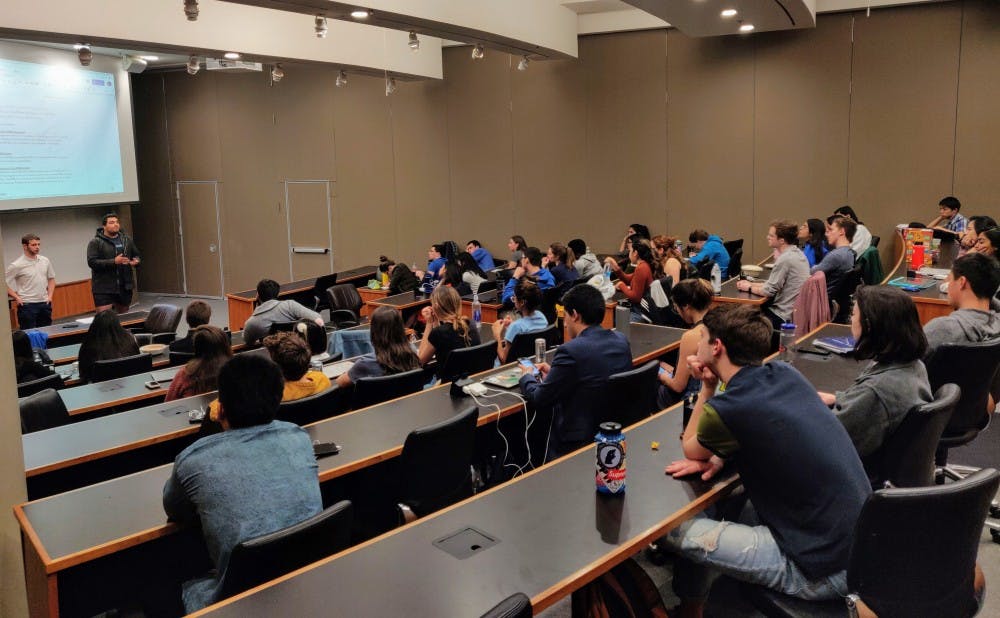Duke Student Government Senate debated more than $300,000 in funding as its annual budget deliberations Wednesday night.
Senior Ben Hubsch, chair of the Student Organization Funding Committee, presented the first reading of DSG’s annual budget for the 2019-2020 school year. SOFC recommended $300,773.99 in funding for SOFC-chartered student groups, excluding club sports. Next week, senators will debate the budget proposal and propose amendments before passing a final version.
In total, 152 groups requested $921,220.96 in funding, of which the budget only includes about a third. In a presentation to the Senate on the basics of budgeting, Hubsch said that the SOFC did not have enough money to approve all of the requested funding.
“Annual budget is not a complete source of funding,” Hubsch said. “[It] should be seen as a subsidy.”
He admitted that it can be difficult to choose which items to fund.
“There’s no set standard for what feels like the most important subsidy, what gets prioritized and what doesn’t,” he said.
His presentation specified that SOFC sometimes had to exercise discretion as to which line items were the most important to specific groups.
If passed, the budget would mark a significant decrease from last year, when the budget was around $380,000.
The largest expense was $16,300 in funding for Mock Trial. Hubsch noted that Mock Trial is an expensive activity and that Duke’s team has been struggling in recent years with its finances.
“They were basically sitting in the meeting begging us for more money than this,” Hubsch said.
Mock Trial was not the only organization to get a planned allocation for a large amount of funding. DSG’s New York Times program has a proposed allocation of $15,000, as Camp Kesem and Duke Robotics Club have $10,000 each.
Some groups did not get anywhere close to what they asked for. Duke Dance Council asked for $50,000 but is now only planned to be given $3,000, as SOFC did not fund requests for money to reserve rooms in Wilson and Brodie Gyms. Several groups were capped at $1,000 in proposed funding because they were new on campus, including Duke Gymnastics, which had requested more than $49,000.
Despite significantly reducing such requests, SOFC had to revise its original budget plan before presenting it to the Senate.
“At first pass, across every group, we funded $341,000 for non-sports clubs,” Hubsch said. This funding included $100,000 for sports clubs. He continued that “that would leave about $350,000 for programming, which is just way too low.”
In order to cut the budget, Hubsch cut “small pieces” from the budgets of the 20 groups with the largest allocations. This included Mock Trial, whose proposed allocation had initially been set at $20,000.
Next week, the Senate will debate amendments to the budget before passing a final funding package for the next school year. Hubsch asked that senators who want to propose amendments contact him before next Wednesday with their suggestions.
In Other Business
The Senate provisionally forgave $7,000 in debt accrued by the Duke International Relations Association. If the organization does not pay off its debt by the end of the 2019-2020 academic year, its SOFC account will be frozen unless another provisional forgiveness is granted.
The Senate chartered the Duke Coaches Organization. According to its constitution, the group seeks “to act as mentors and leaders for the youth of Durham through the unique medium of sports.”
The chamber also approved $1,630 in SOFC programming funding for HackDuke’s Ideate 2019 event—a student design and innovation conference.
Get The Chronicle straight to your inbox
Signup for our weekly newsletter. Cancel at any time.
Matthew Griffin was editor-in-chief of The Chronicle's 116th volume.

